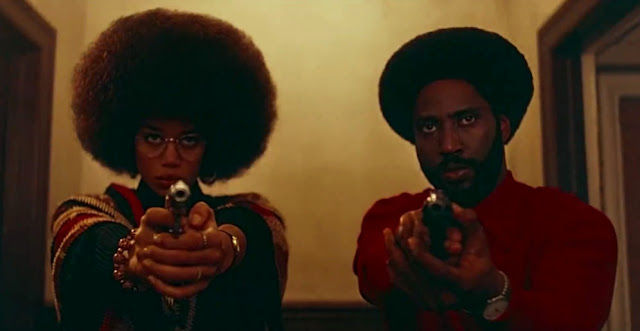BlacKkKlansman: Film Review
Cast: John David Washington, Adam Driver, Topher Grace, Laura Harrier, James Badge Dale
Director: Spike Lee
As much a blaxploitation piece cum shaggy dog story as a "Is that really true?" story, BlacKkKlansman is as exaggerated a story piece as it is unsubtle.
Director Spike Lee shines in large swathes of the film, but the final 4 minutes, which chooses to insert real life Charlottesville footage into proceedings, shows how cancerous the insertion of real-life footage is proving to be in dramas and documentaries.
BlacKkKlansman is the story of a rookie Colorado Springs cop, Ron Stallworth (Washington, in a mesmerising and yet grounded turn) who in the 1970s wanted to join the police force. After being subjected to a rather degrading interview, Stallworth finds himself working the evidence room, but pushes his bosses to join other divisions.
That's granted and he's sent undercover to a Black Power meeting on a surveillance job. It's here that he meets Laura Harrier's Patrice and finds himself going deeper into the movement than he expected as he wrestles with the idea that he can change their world outlook from within.
However, things get spookier for Stallworth when jokingly one day he decides to call the Ku Klux Klan and gets co-opted in. But, he can't attend meetings so he sends Detective Flip Zimmerman as his body double (Driver, in a suitably stoic turn) - but things get more complicated the longer the ruse goes on...
"Dis joint based on some real fo'sure shit" is Lee's opening gambit - and once past the use of Gone With The Wind and Alec Baldwin's weirdly out of place ranting, BlacKkKlansman becomes a film that feels like Superfly got mixed in with the DNA of a buddy cop movie and a undercover cop falling in love film that you've seen a million times before.
However, that's also where Lee's ability to subvert your expectations works best - he shuns the cliched and presents a film that crackles with contemporary commentary (Make America Great, America would never elect someone like that are lines mentioned a few times in throwaway lines) and seethes with indignation when it should.
Which is why it's a shame that later in proceedings, this black humour film where no one is really laughing drops the ball in favour of less subtle forms of visual protest. A sequence involving Harry Belafonte recounting a real life racist situation as he addresses Black Power activists and the aforementioned Charlottesville footage feel like a hammer being used to crack a nut.
Perhaps there's an argument stating that desperate times resort to desperate measures, but it's infinitely irritating to see a master craftsman like Lee stepping back from letting his work do the talking.
It's the only thing which derails Lee's BlacKkKlansman - perhaps if he'd been reined in a little, the glorious dialogue, utterly ludicrous reality and the subtleties would have been more powerful; instead, the over-egging leaves a bad taste in your mouth, a feeling that Lee's vitriol has got the better of his creative edges.
Washington is mightily impressive, imbuing Stallworth with both heart, indignation and naivete; equally Driver's turn shows why his dependable performances are becoming the most important assets he brings to films he's in.
Sure, there are shocks throughout, and rightly so, but Lee never presents the KKK as anything other than inept, crippled by their bigotry and sidelined by their stupidity of belief.
Ultimately, for the most part, BlacKkKlansman is a film that ripples with unease, humour and gallows jokes in a mix that proves potent. It's just a shame that the hammer - nut approach employed at the end makes you feel like it's less Fight The Power, more Shout the Power down and then keep doing so.



.jpg)


%20&%20Edith%20Poor%20(Lizzie%20Moyle)_%C2%A9BBCS%20&%20Bunya%20Entertainment.jpg)
No comments:
Post a Comment